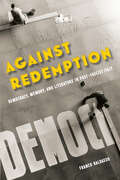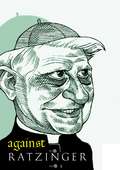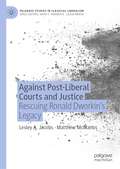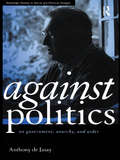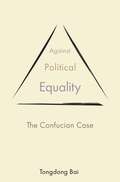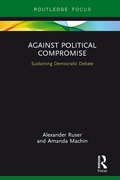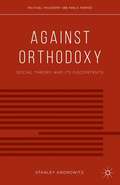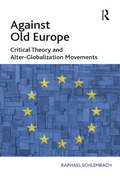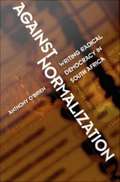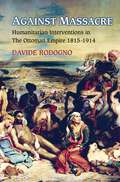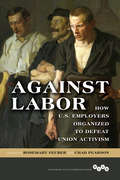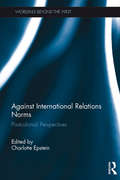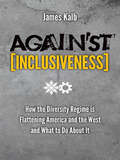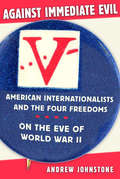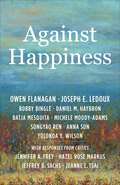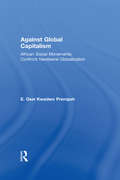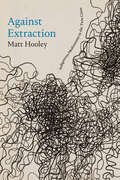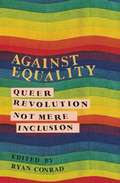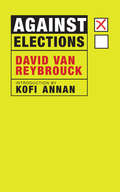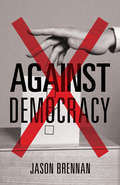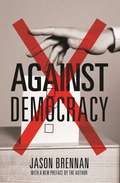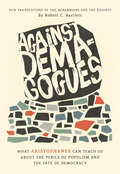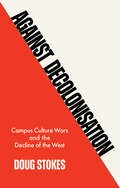- Table View
- List View
Against Redemption: Democracy, Memory, and Literature in Post-Fascist Italy (World War II: The Global, Human, and Ethical Dimension)
by Franco BaldassoDiscloses the richness of ideas and sheds light on the controversy that characterized the transition from fascism to democracy, examining authors, works and memories that were subsequently silenced by Cold War politics.How a shared memory of Fascism and its cultural heritage took shape is still today the most disputed question of modern Italy, crossing the boundaries between academic and public discourse. Against Redemption concentrates on the historical period in which disagreement was at its highest: the transition between the downfall of Mussolini in July 1943 and the victory of the Christian Democrats over the Left in the 1948 general elections. By dispelling the silence around the range of opinion in the years before the ideological struggle fossilized into Cold War oppositions, this book points to early postwar literary practices as the main vehicle for intellectual dissent, shedding new light on the role of cultural policies in institutionalizing collective memory.During Italy’s transition to democracy competing narratives over the recent traumatic past emerged and crystallized, depicting the country’s break with Mussolini’s regime as a political and personal redemption from its politics of exclusion and unrestrained use of violence. Conversely, outstanding authors such as Elsa Morante, Carlo Levi, Alberto Moravia and Curzio Malaparte, in close dialogue with remarkable but now neglected figures, stressed the cultural continuity between the new democracy and Fascism, igniting heated debates from opposite political standpoints. Their works addressed questions such as the working through of national defeat, Italian responsibility in WWII and the Holocaust, revealing how the social, racial, and gender biases that characterized Fascism survived after its demise and haunted the new born democracy.
Against Ratzinger
by Antony ShugaarPublished anonymously in Italy on the one-year anniversary of Ratzinger's election to the papacy, Against Ratzinger caused a national stir and immediately shot onto bestseller lists. Now America, the home of over 67 million Catholics, will have the opportunity to wrestle with this insightful and revealing examination of Pope Benedict XVI. This concise volume analyzes and critiques the pronouncements of Ratzinger. Addressing some of the most dramatic and pressing issues of our time, Against Ratzigner studies the Pope's responses to birth control, abortion, and sexual abuse in the Church. Against Ratzinger charts Ratzinger's rise to power from his arrival in Rome in 1981 and addresses his close relationship with the late Pope John Paul II.
Against Post-Liberal Courts and Justice: Rescuing Ronald Dworkin’s Legacy (Palgrave Studies in Classical Liberalism)
by Lesley A. Jacobs Matthew McManusThis book covers how Liberal institutions – constitutional democracy, economic markets, liberal courts, free trade, international human rights – around the world are under assault by the political right and we are witnessing the emergence of post-liberal institutions. These post-liberal institutions are founded on the core conviction that the actions of liberal institutions including the United States Supreme Court are patently unjust. This volume makes the case against post-liberal courts and justice by reconnecting to the principles of moral equality and dignified freedom for all. The intention is to show how there is great untapped potential in the work of Ronald Dworkin’s work to demonstrate that it can help progressive liberals think through the great issues of the day and respond to the contemporary criticisms of the political right. The core themes are concretely illustrated by focusing on some of the most controversial recent post-liberal decisions of the Supreme Court, ranging from election funding to abortion to race-sensitive affirmative action, to economic inequality in an age of increasingly unequal opportunities.
Against Politics: On Government, Anarchy and Order (Routledge Studies in Social and Political Thought)
by Anthony De JasayIs the state a necessity, a convenience, or neither? It enforces collective choices in which some override the preferences and dispose of the resources of others. Moreover, collective choice serves as its own source of authority and preempts the space it wishes to occupy. The morality and efficacy of the result are perennial questions central to political philosophy.In Against Politics Jasay takes a closely reasoned stand, based on modern rational choice arguments, for rejecting much of mainstream thought about these matters. In the first part of the book, Excuses, he assesses the standard justification of government based consent, the power of constitutions to achieve limited government, and ideas for reforming politics. In the second part, Emergent Solutions , he explores the force of first principles to secure liberties and rights and some of the potential of spontaneous conventions for generating ordered anarchy.Written with clarity and simplicity, this powerful volume represents the central part of Jasay's recent work. Fully accessible to the general reader, it should stimulate the specialist reader to fresh thought.
Against Political Equality: The Confucian Case (The Princeton-China Series #10)
by Tongdong BaiWhat might a viable political alternative to liberal democracy look like? In Against Political Equality, Tongdong Bai offers a possibility inspired by Confucian ideas.Bai argues that domestic governance influenced by Confucianism can embrace the liberal aspects of democracy along with the democratic ideas of equal opportunities and governmental accountability to the people. But Confucianism would give more political decision-making power to those with the moral, practical, and intellectual capabilities of caring for the people. While most democratic thinkers still focus on strengthening equality to cure the ills of democracy, the proposed hybrid regime—made up of Confucian-inspired meritocratic characteristics combined with democratic elements and a quasi-liberal system of laws and rights—recognizes that egalitarian qualities sometimes conflict with good governance and the protection of liberties, and defends liberal aspects by restricting democratic ones. Bai applies his views to the international realm by supporting a hierarchical order based on how humane each state is toward its own and other peoples, and on the principle of international interventions whereby humane responsibilities override sovereignty.Exploring the deficiencies posed by many liberal democracies, Against Political Equality presents a novel Confucian-engendered alternative for solving today’s political problems.
Against Political Compromise: Sustaining Democratic Debate
by Alexander Ruser Amanda MachinPolitical compromise is emerging as a preferred solution for numerous apparently intractable problems. Many have pointed to the rising degree of political polarisation around issues such as climate change, immigration and abortion. These are ‘wicked problems’ that are clearly not conducive to any sort of political consensus. The groups and individuals who are party to these issues disagree, often both fully and fiercely. As an alternative, political compromise seemingly offers a way of respecting difference while simultaneously generating a decision upon which policy can move forward. But proponents of political compromise should also acknowledge its significant weaknesses and dangers. Invoking recent examples from various policy areas to illustrate their claims, the authors assert that compromise can disguise inequality, reduce plurality and heighten uncertainty. In short, compromise can weaken democracy and must not be seen as some sort of political panacea. This concise, accessible text offers a strong and provocative argument that provides a crucial counterpoint to the promise of compromise. It should prove of interest to students and scholars interested in compromise and consensus as well as democratic governance, social inequality, political apathy and environmental politics.
Against Perfectionism
by Steven LecceIn a democracy, political authority should be determined independently of religious, philosophical, and ethical ideals that often divide us. This idea, called liberal neutrality, challenges one of the oldest insights of the Western philosophical tradition in politics. At least since Plato, the concept of perfectionism has insisted that statecraft is akin to "soulcraft," and political questions about the justification of state power have followed from ethical questions about what is valuable in life and about how we should live if we are to live well. Against Perfectionism defends neutralist liberalism as the most appropriate political morality for democratic societies. Steven Lecce investigates the theoretical foundations of liberalism, bringing together classic and contemporary arguments about the implications of pluralism for liberal equality. He surveys three classic debates over the grounds and limits of tolerance, and investigates the limits of perfectionism as a guide to law and public policy in pluralist societies. Lecce ultimately suggests a version of neutrality that answers the critiques recently leveled against it as a political ideal. Presenting sophisticated and groundbreaking arguments, Against Perfectionism is a call to rethink current concepts of law and public policy in democratic societies.
Against Orthodoxy
by Stanley AronowitzIn Against Orthodoxy, the author engages some of the most provocative thinkers of the twentieth century, including Georg Lukacs, Antonio Gramsci, Herbert Marcuse, Karl Marx, Harry Braverman and Paulo Freire. All of these social and political theorists were dedicated to fundamental social change, but many were forced to recognize the difficulty of achieving change in the modern world. This book demonstrates that all of them reject conventional interpretations of how radical change mightbe possible. What marks their unity is an effort to address capitalism's ability to incorporate widespread popular alienation. Consequently they urge serious attention to issues of culture, subjectivity, and education.
Against Old Europe: Critical Theory and Alter-Globalization Movements
by Raphael SchlembachIn the wake of the Iraq war, the term Old Europe was appropriated by politicians, civil society and social movement actors alike to rally in defence of supposedly social and civilized values against the perceived predatory forces of American finance. Against Old Europe sheds light on the social movement politics encapsulated in the protest slogan 'Fight Old Europe'. Within what is broadly labelled the global justice movement, it explores a particular, radical perspective that warns against the identification with European values by movements resisting neoliberalism. Exploring the work of key theorists critical of globalization, including Habermas, Negri, Holloway, Postone and de Benoist, the book examines critical theory approaches to alter-globalization, illustrated with concrete examples of movements within contemporary Europe. In so doing, it invites readers to explore the charges of nationalism, anti-Americanism and antisemitism brought against parts of the alter-globalization movement. Providing a new perspective on critiques of globalization, Against Old Europe will appeal to sociologists and social and political theorists studying social movements, anti-globalization activism and European politics and identity.
Against Normalization: Writing Radical Democracy in South Africa
by Anthony O'BrienAt the end of apartheid, under pressure from local and transnational capital and the hegemony of Western-style parliamentary democracy, South Africans felt called upon to normalize their conceptions of economics, politics, and culture in line with these Western models. In Against Normalization, however, Anthony O'Brien examines recent South African literature and theoretical debate which take a different line, resisting this neocolonial outcome, and investigating the role of culture in the formation of a more radically democratic society. O'Brien brings together an unusual array of contemporary South African writing: cultural theory and debate, worker poetry, black and white feminist writing, Black Consciousness drama, the letters of exiled writers, and postapartheid fiction and film. Paying subtle attention to well-known figures like Nadine Gordimer, Bessie Head, and Njabulo Ndebele, but also foregrounding less-studied writers like Ingrid de Kok, Nise Malange, Maishe Maponya, and the Zimbabwean Dambudzo Marechera, he reveals in their work the construction of a political aesthetic more radically democratic than the current normalization of nationalism, ballot-box democracy, and liberal humanism in culture could imagine. Juxtaposing his readings of these writers with the theoretical traditions of postcolonial thinkers about race, gender, and nation like Paul Gilroy, bell hooks, and Gayatri Spivak, and with others such as Samuel Beckett and Vaclav Havel, O'Brien adopts a uniquely comparatist and internationalist approach to understanding South African writing and its relationship to the cultural settlement after apartheid. With its appeal to specialists in South African fiction, poetry, history, and politics, to other Africanists, and to those in the fields of colonial, postcolonial, race, and gender studies, Against Normalization will make a significant intervention in the debates about cultural production in the postcolonial areas of global capitalism.
Against Massacre: Humanitarian Interventions in the Ottoman Empire, 1815-1914 (Human Rights and Crimes against Humanity #10)
by Davide RodognoAgainst Massacre looks at the rise of humanitarian intervention in the nineteenth century, from the fall of Napoleon to the First World War. Examining the concept from a historical perspective, Davide Rodogno explores the understudied cases of European interventions and noninterventions in the Ottoman Empire and brings a new view to this international practice for the contemporary era. While it is commonly believed that humanitarian interventions are a fairly recent development, Rodogno demonstrates that almost two centuries ago an international community, under the aegis of certain European powers, claimed a moral and political right to intervene in other states' affairs to save strangers from massacre, atrocity, or extermination. On some occasions, these powers acted to protect fellow Christians when allegedly "uncivilized" states, like the Ottoman Empire, violated a "right to life." Exploring the political, legal, and moral status, as well as European perceptions, of the Ottoman Empire, Rodogno investigates the reasons that were put forward to exclude the Ottomans from the so-called Family of Nations. He considers the claims and mixed motives of intervening states for aiding humanity, the relationship between public outcry and state action or inaction, and the bias and selectiveness of governments and campaigners. An original account of humanitarian interventions some two centuries ago, Against Massacre investigates the varied consequences of European involvement in the Ottoman Empire and the lessons that can be learned for similar actions today.
Against Labor: How U.S. Employers Organized to Defeat Union Activism
by Chad Pearson Rosemary FeurerAgainst Labor highlights the tenacious efforts by employers to organize themselves as a class to contest labor. Ranging across a spectrum of understudied issues, essayists explore employer anti-labor strategies and offer incisive portraits of people and organizations that aggressively opposed unions. Other contributors examine the anti-labor movement against a backdrop of larger forces, such as the intersection of race and ethnicity with anti-labor activity, and anti-unionism in the context of neoliberalism. Timely and revealing, Against Labor deepens our understanding of management history and employer activism and their metamorphic effects on workplace and society. Contributors: Michael Dennis, Elizabeth Esch, Rosemary Feurer, Dolores E. Janiewski, Thomas A. Klug, Chad Pearson, Peter Rachleff, David Roediger, Howard Stanger, and Robert Woodrum.
Against International Relations Norms: Postcolonial Perspectives (Worlding Beyond the West)
by Charlotte EpsteinThis volume uses the concept of ‘norms’ to initiate a long overdue conversation between the constructivist and postcolonial scholarships on how to appraise the ordering processes of international politics. Drawing together insights from a broad range of scholars, it evaluates what it means to theorise international politics from a postcolonial perspective, understood not as a unified body of thought or a new ‘-ism’ for IR, but as a ‘situated perspective’ offering ex-centred, post-Eurocentric sites for practices of situated critique. Through in-depth engagements with the norms constructivist scholarship, the contributors expose the theoretical, epistemological and practical erasures that have been implicitly effected by the uncritical adoption of ‘norms’ as the dominant lens for analysing the ideational dynamics of international politics. They show how these are often the very erasures that sustained the workings of colonisation in the first place, whose uneven power relations are thereby further sustained by the study of international politics. The volume makes the case for shifting from a static analysis of ‘norms’ to a dynamic and deeply historical understanding of the drawing of the initial line between the ‘normal’ and the ‘abnormal’ that served to exclude from focus the 'strange' and the unfamiliar that were necessarily brought into play in the encounters between the West and the rest of the world. A timely intervention, it will be of great interest to students and scholars of international relations, international relations theory and postcolonial scholarship.
Against Inclusiveness: How the Diversity Regime is Flattening America and the West and What to Do About It
by James KalbDiversity. Inclusiveness. Equality.--ubiquitous words in 21st-century political and social life. But how do those who police the limits of acceptable discourse employ these as verbal weapons to browbeat their often hapless fellows into having a "real conversation"? How do these terms function as mere doublespeak for the expectation of full-scale capitulation to the views of "right-thinking people"? Those who have long been afraid to touch the issues that attend these words will take great reassurance in an articulate statement of the kind presented in Against Inclusiveness, where the author's approach is sober and extremely well reasoned, as he attempts to marshal truth and fairness as criteria in the examination of issues critical to modern social life. Kalb argues that in current inclusiveness ideology, "classifying people" becomes an exercise of power by the classifier that denies the dignity of the person classified. All rational consideration of human reality is thereby suspended, and the result is something arbitrary and increasingly tyrannical. Against Inclusiveness lays the foundation for what an honest, forthright, real conversation on these matters might look like.
Against Immediate Evil: American Internationalists and the Four Freedoms on the Eve of World War II
by Andrew JohnstoneIn Against Immediate Evil, Andrew Johnstone tells the story of how internationalist Americans worked between 1938 and 1941 to convince the U.S. government and the American public of the need to stem the rising global tide of fascist aggression. As war approached, the internationalist movement attempted to arouse the nation in order to defeat noninterventionism at home and fascism overseas. Johnstone's examination of this movement undermines the common belief that the Japanese attack on Pearl Harbor wrenched an isolationist United States into global armed conflict and the struggle for international power. Johnstone focuses on three organizations—the American Committee for Non-Participation in Japanese Aggression, the Committee to Defend America by Aiding the Allies, and Fight For Freedom—that actively promoted a more global role for the United States based on a conception of the "four freedoms" later made famous by FDR. The desire to be free from fear was seen in concerns regarding America’s immediate national security. The desire to be free from want was expressed in anxieties over the nation’s future economic prosperity. The need for freedom of speech was represented in concerns over the potential loss of political freedoms. Finally, the need for freedom of worship was seen in the emphasis on religious freedoms and broader fears about the future of Western civilization. These groups and their supporters among the public and within the government characterized the growing global conflict as one between two distinct worlds and in doing so, set the tone of American foreign policy for decades to come.
Against Happiness
by Owen Flanagan Joseph E. LeDoux Bobby Bingle Daniel M. Haybron Batja Mesquita Michele Moody-Adams Songyao Ren Anna Sun Yolonda Y. WilsonThe “happiness agenda” is a worldwide movement that claims that happiness is the highest good, happiness can be measured, and public policy should promote happiness. Against Happiness is a thorough and powerful critique of this program, revealing the flaws of its concept of happiness and advocating a renewed focus on equality and justice.Written by an interdisciplinary team of authors, this book provides both theoretical and empirical analysis of the limitations of the happiness agenda. The authors emphasize that this movement draws on a parochial, Western-centric philosophical basis and demographic sample. They show that happiness defined as subjective satisfaction or a surplus of positive emotions bears little resemblance to the richer and more nuanced concepts of the good life found in many world traditions. Cross-cultural philosophy, comparative theology, and social and cultural psychology all teach that cultures and subcultures vary in how much value they place on life satisfaction or feeling happy. Furthermore, the ideas promoted by the happiness agenda can compete with rights, justice, sustainability, and equality—and even conceal racial and gender injustice.Against Happiness argues that a better way forward requires integration of cross-cultural philosophical, ethical, and political thought with critical social science. Ultimately, the authors contend, happiness should be a secondary goal—worth pursuing only if it is contingent on the demands of justice.
Against Global Capitalism: African Social Movements Confront Neoliberal Globalization
by E. Osei PrempehThe fundamental challenge of democratizing globalization by opening up spaces for democratic participation beyond the state is addressed in this study. The author captures both the democratic activities and voices of opposition to neoliberal globalization and investigates how this reinvention of democracy through resistance to neoliberal globalization has taken shape in the African context. In doing so, he reasserts the relevance of the de-globalization and anti-capitalism movements. With a careful selection of case studies, this volume is ideal for classroom use and library reference.
Against Extraction: Indigenous Modernism in the Twin Cities
by Matt HooleyIn Against Extraction Matt Hooley traces a modern tradition of Ojibwe invention in Minneapolis and St. Paul from the mid-nineteenth century to the present as that tradition emerges in response to the cultural legacies of US colonialism. Hooley shows how Indigenous literary and visual art modernisms challenge the strictures of everyday life and question the ecological, political, and cultural fantasies that make multivalent US colonialism seem inevitable. Hooley analyzes literature and art by Louise Erdrich, William Whipple Warren, David Treuer, George Morrison, and Gerald Vizenor in relation to histories of Indigenous dispossession and occupation, enslavement and Black life, and environmental harm and care. He shows that historical narratives of these cities are intimately bound up with the violence of colonial systems of extraction and that concepts like Indigeneity and sovereignty extend beyond treaty-granted promises of political control. These works, created in opposition and proximity to the extraction of cultural, political, and territorial resources, demonstrate how Indigenous claims to life and land matter to rethinking and unmaking the social and ecological devastations of the colonial world.
Against Equality
by Ryan ConradWhen "rights" go wrong.Does gay marriage support the right-wing goal of linking access to basic human rights like health care and economic security to an inherently conservative tradition?Will the ability of queers to fight in wars of imperialism help liberate and empower LGBT people around the world?Does hate-crime legislation affirm and strengthen historically anti-queer institutions like the police and prisons rather than dismantling them? The Against Equality collective asks some hard questions. These queer thinkers, writers, and artists are committed to undermining a stunted conception of "equality." In this powerful book, they challenge mainstream gay and lesbian struggles for inclusion in elitist and inhumane institutions. More than a critique, Against Equality seeks to reinvigorate the queer political imagination with fantastic possibility! "In an era when so much of the lesbian and gay movement seems to echo the rhetoric of the mainstream Establishment, the work of Against Equality is an important provocation and corrective.... I hope this book is read widely, particularly by the people who will most disagree with it; in the tradition of the great political pamphleteers, this collection should spark debate around some of the key issues for our movement." -Dennis Altman, author of Homosexual: Oppression & Liberation "Against Equality issues a radical call for social transformation. Against and beyond the "holy trinity" of pragmatic gay politics-marriage, militarism, and prison-the queer and trans voices archived in this collection offer a radical left critique of neoliberalism, capitalism, and state oppression. In a format accessible and enlivening, equally at home in the classroom and on the street, this book keeps our political imaginations alive. Prepare to be challenged, educated, and inspired." -Margot Weiss, author of Techniques of Pleasure
Against Equality: Queer Revolution, Not Mere Inclusion
by Ryan ConradWhen “rights” go wrong.<P> Does gay marriage support the right-wing goal of linking access to basic human rights like health care and economic security to an inherently conservative tradition?<P> Will the ability of queers to fight in wars of imperialism help liberate and empower LGBT people around the world?<P> Does hate-crime legislation affirm and strengthen historically anti-queer institutions like the police and prisons rather than dismantling them?<P> The Against Equality collective asks some hard questions. These queer thinkers, writers, and artists are committed to undermining a stunted conception of “equality.” In this powerful book, they challenge mainstream gay and lesbian struggles for inclusion in elitist and inhumane institutions. More than a critique, Against Equality seeks to reinvigorate the queer political imagination with fantastic possibility!
Against Elections: The Case For Democracy
by David Van Reybrouck Kofi AnnanA small book with great weight and urgency to it, this is both a history of democracy and a clarion call for change."Without drastic adjustment, this system cannot last much longer," writes Van Reybrouck, regarded today as one of Europe's most astute thinkers. "If you look at the decline in voter turnout and party membership, and at the way politicians are held in contempt, if you look at how difficult it is to form governments, how little they can do and how harshly they are punished for it, if you look at how quickly populism, technocracy and anti-parliamentarianism are rising, if you look at how more and more citizens are longing for participation and how quickly that desire can tip over into frustration, then you realize we are up to our necks." Not so very long ago, the great battles of democracy were fought for the right to vote. Now, Van Reybrouck writes, "it's all about the right to speak, but in essence it's the same battle, the battle for political emancipation and for democratic participation. We must decolonize democracy. We must democratize democracy." As history, Van Reybrouck makes the compelling argument that modern democracy was designed as much to preserve the rights of the powerful and keep the masses in line, as to give the populace a voice. As change-agent, Against Elections makes the argument that there are forms of government, what he terms sortitive or deliberative democracy, that are beginning to be practiced around the world, and can be the remedy we seek. In Iceland, for example, deliberative democracy was used to write the new constitution. A group of people were chosen by lot, educated in the subject at hand, and then were able to decide what was best, arguably, far better than politicians would have. A fascinating, and workable idea has led to a timely book to remind us that our system of government is a flexible instrument, one that the people have the power to change.
Against Democracy
by Jason BrennanMost people believe democracy is a uniquely just form of government. They believe people have the right to an equal share of political power. And they believe that political participation is good for us--it empowers us, helps us get what we want, and tends to make us smarter, more virtuous, and more caring for one another. These are some of our most cherished ideas about democracy. But, Jason Brennan says, they are all wrong.In this trenchant book, Brennan argues that democracy should be judged by its results--and the results are not good enough. Just as defendants have a right to a fair trial, citizens have a right to competent government. But democracy is the rule of the ignorant and the irrational, and it all too often falls short. Furthermore, no one has a fundamental right to any share of political power, and exercising political power does most of us little good. On the contrary, a wide range of social science research shows that political participation and democratic deliberation actually tend to make people worse--more irrational, biased, and mean. Given this grim picture, Brennan argues that a new system of government--epistocracy, the rule of the knowledgeable--may be better than democracy, and that it's time to experiment and find out.A challenging critique of democracy and the first sustained defense of the rule of the knowledgeable, Against Democracy is essential reading for scholars and students of politics across the disciplines.
Against Democracy: New Preface
by Jason BrennanMost people believe democracy is a uniquely just form of government. They believe people have the right to an equal share of political power. And they believe that political participation is good for us—it empowers us, helps us get what we want, and tends to make us smarter, more virtuous, and more caring for one another. These are some of our most cherished ideas about democracy. But Jason Brennan says they are all wrong.In this trenchant book, Brennan argues that democracy should be judged by its results—and the results are not good enough. Just as defendants have a right to a fair trial, citizens have a right to competent government. But democracy is the rule of the ignorant and the irrational, and it all too often falls short. Furthermore, no one has a fundamental right to any share of political power, and exercising political power does most of us little good. On the contrary, a wide range of social science research shows that political participation and democratic deliberation actually tend to make people worse—more irrational, biased, and mean. Given this grim picture, Brennan argues that a new system of government—epistocracy, the rule of the knowledgeable—may be better than democracy, and that it's time to experiment and find out.A challenging critique of democracy and the first sustained defense of the rule of the knowledgeable, Against Democracy is essential reading for scholars and students of politics across the disciplines. Featuring a new preface that situates the book within the current political climate and discusses other alternatives beyond epistocracy, Against Democracy is a challenging critique of democracy and the first sustained defense of the rule of the knowledgeable.
Against Demagogues: What Aristophanes Can Teach Us about the Perils of Populism and the Fate of Democracy, New Translations of the Acharnians and the Knights
by Prof. Robert C. BartlettTimeless comedies on resisting tyranny from one of history’s greatest comic playwrights. Against Demagogues presents Robert C. Bartlett's new translations of Aristophanes' most overtly political works, the Acharnians and the Knights. In these fantastically inventive, raucous, and raunchy comedies, the powerful politician Cleon proves to be democracy's greatest opponent. With unrivalled power, both plays make clear the dangers to which democracies are prone, especially the threats posed by external warfare, internal division, and class polarization. Combating the seductive allure of demagogues and the damage they cause, Against Demagogues disentangles Aristophanes' serious teachings from his many jokes and pratfalls, substantiating for modern readers his famous claim to "teach justice" while "making a comedy" of the city. The book features an interpretive essay for each play, expertly guiding readers through the most important plot points, explaining the significance of various characters, and shedding light on the meaning of the plays' often madcap episodes. Along with a contextualizing introduction, Bartlett offers extensive notes explaining the many political, literary, and religious references and allusions. Aristophanes' comedic skewering of the demagogue and his ruthless ambition—and of a community so ill-informed about the doings of its own government, so ready to believe in empty promises and idle flattery—cannot but resonate strongly with readers today around the world.
Against Decolonisation: Campus Culture Wars and the Decline of the West
by Doug StokesFollowing the killing of George Floyd in 2020, a moral panic gripped the US and UK. To atone for an alleged history of racism, statues were torn down and symbols of national identity attacked. Across universities, fringe theories became the new orthodoxy, with a cadre of activists backed by university technocrats adopting a binary worldview of moral certainty, sin and deconstructive redemption through Western self-erasure. This hard-hitting book surveys these developments for the first time. It unpacks and challenges the theories and arguments deployed by ‘decolonisers’ in a university system now characterised by garbled leadership and illiberal groupthink. The desire to question the West’s sense of itself, deconstruct its narratives and overthrow its institutional order is an impulse that, ironically, was underpinned by a more confident and assured Western hegemony, which is now waning and under great strain. If its light continues to dim, who or what will carry the torch for human freedom and progress?
